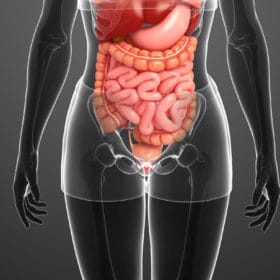Thanks to the huge media uproar of recent years, the term binge drinking is now familiar to pretty much everyone. The situation is a little different with Binge eating. But the principle is the same. Of course, it is completely normal for each of us to go completely overboard with food from time to time.
After all, the buffet on vacation or the cooking skills of a dear family member are sometimes too tempting to resist. However, if the "overeating" happens regularly and completely uncontrollably, it is already a genuine eating disorder that can have massive consequences. We'll tell you everything you need to know about binge eating.
What is binge eating anyway?
Even if some people laugh at binge eating, it is an eating disorder that is just as serious as anorexia. Basically, the eating disorder is defined by the fact that those affected regularly consume unusually large amounts of food within a certain period of time.
Typical here is the complete loss of control over the amount of food eaten - in other words, those affected can no longer really stop eating. However, an eating disorder is only diagnosed if this phenomenon occurs at least once a week on average over a period of at least three months. The severity of the disorder is therefore also determined by the frequency of the "binge eating".
In contrast to bulimia, for example, most "binge eaters" do not try to compensate for the additional calories consumed by taking measures such as vomiting or excessive exercise. Instead, they often try "normal" diets. According to official statistics, it is actually the most common eating disorder. It mainly affects overweight and obese people. But people of normal weight can also easily slip into this pattern.
Typical habits of those affected
- Strong urge to eat, which can hardly be resisted
- Intake of very large amounts of food without hunger
- Frequent dieting (including extreme diets)
- Eating far beyond the satiety threshold (e.g. unpleasant pressure in the stomach)
- Feelings of guilt or disgust after binge eating
- The feeling of losing control
- Hectic or very fast food
- Not eating together with other people out of shame
Causes of the unpleasant eating disorder
Unfortunately, no one currently knows the exact cause of the development of binge eating disorder. However, there is a direct link to risk factors such as the psyche, genetics and eating behavior itself.
In general, all people can develop an eating disorder, but the risk is particularly high in the late teens and early twenties. In addition, significantly more women than men are affected by eating disorders. The following three points emerge as the greatest risk factors:
- Frequent negative emotions are a major risk factor. This can be, for example, a negative perception of one's own body. But severe stress, disappointment, bullying, loneliness or the mere fear of being hurt can also lead to overeating.
- According to current scientific findings, genetics can also have an influence on the development of an eating disorder. For example, the risk is significantly higher in people whose parents or siblings already suffer or have suffered from an eating disorder. However, an exact genetic cause has not yet been found.
- Diet and eating habits are also a common cause. It usually affects people who diet hard throughout the day. Then at some point the dam breaks and they shovel everything into themselves in the evening. But an unhealthy diet can also promote binge eating. Large fluctuations in blood sugar levels due to a diet based predominantly on short-chain carbohydrates are a huge risk factor here.
Binge eating can have massive consequences
Like any other eating disorder, binge eating should not be taken lightly. In the long term, "overeating" also damages your health and increases the risk of serious health problems. This applies to both physical and psychological consequences.
Physical consequences
On the physical side, the risk of severe overweight or even obesity increases. Not all clinically obese people are affected by such an eating disorder. On the other hand, around two thirds of all binge eaters are people who have a significantly above-average body weight. Obesity is associated with numerous related illnesses.
These include overuse-related joint problems (e.g. osteoarthritis), type 2 diabetes, sleep disorders, respiratory diseases and gastroesophageal reflux disease. The obesity resulting from the eating disorder also increases the risk of coronary artery calcification, heart attacks and strokes.
Psychological and social consequences
Of course, the psyche is not unaffected by such an eating disorder. After all, it can massively restrict your quality of life. The greatest danger here is the increasing social isolation. Many sufferers find it embarrassing to eat in the presence of other people, as they notice how much the person concerned actually eats.
What starts with avoiding lunch together at work quickly develops into a comprehensive social withdrawal. This quickly leads to complications both at work and in the private sphere. Closely linked to this problem are psychological disorders that often occur in connection with "overeating".
The main symptoms are depression or depressive moods, bipolar disorders and full-blown phobias. In some cases, the psychological burden of binge eating even culminates in alcohol and drug abuse.
When should I see a doctor?
So you can see that this eating disorder is no joke. If you recognize the first warning signs in yourself or someone you care about, you need to act. The dangerous thing about binge eating is that the disorder often develops gradually over years and is all the more persistent. So: act quickly and don't be afraid to talk to your doctor about the symptoms and your feelings. The latter in particular is extremely important.
You should take these warning signs of binge eating seriously
One of the following signals alone is no cause for concern. However, the more warning signals occur together, the more alert you should be.
- You are afraid to eat in public or with other people.
- You withdraw from your circle of friends or avoid activities that you previously enjoyed.
- You hoard food (especially in unusual places).
- You tend to frequently try out new extreme diets (e.g. no carbohydrates/fat, vegan, vegetarian, etc.).
- You often look at yourself in the mirror and check yourself for flaws.
- Your thoughts often revolve around your weight and your figure.
- self-confidence is rather low.
- You develop strange rituals when eating (e.g. certain foods are not allowed to touch each other).
- Your eating behavior is extremely irregular.
- You suffer from a strongly fluctuating body weight.
- You often experience digestive problems such as heartburn, constipation or stomach cramps.
- Formation of feelings of guilt or shame after a binge eating episode.
- There are often secret eating binges.
- You organize your daily routine so that you have enough time for binge eating.
- You often find it difficult to concentrate in everyday life because your thoughts revolve around food.
- When shopping, you often buy large packs that empty unusually quickly. (An unusually large pile of garbage can help you to recognize an eating disorder in a family member or a friend).
The 6 best tips for overcoming binge eating
1 - Get support
The most important step is to get help. Pour your heart out to someone you can trust or, ideally, talk to a doctor straight away. Self-help groups are also an excellent way to get a grip on binge eating. It's completely normal to feel a little anxious about it. However, you will realize how relieved you are when you free yourself from this burden by confiding in someone. The chances of success also increase considerably.
2 - Stop thinking in black and white patterns
Unfortunately, we humans have been thinking more and more in extremes recently. But thinking in black and white patterns is a big mistake. Of course, this also applies to dealing with binge eating. You don't have to eat in an extreme way to be healthy. You don't have to look like a model to lead a beautiful life. It's okay to go overboard sometimes. It's all ok as long as it doesn't get out of hand. So, stop limiting yourself and see the world as it is: colorful!
3 - Learn to love yourself
Disordered eating behavior often stems from a disturbed self-perception. This is often based on the idea that other people only love you if you do something specific, look a certain way or have achieved something specific. However, this is not the case; you are lovable regardless of your appearance or eating habits. To understand this, it helps if you talk to other people about your problem.
4 - Avoid extreme behavior
Extreme eating habits increase the risk of developing a binge eating disorder. It is best to focus on a balanced and healthy diet in combination with sufficient exercise. On the other hand, avoid extreme diets with long periods of hunger or extreme diets in which you go without fats or carbohydrates to a large extent.
5 - Process negative feelings through exercise
Sport is an excellent way to clear your head. One of the reasons for this is that endurance exercise releases happiness hormones that flood your body like a drug. In endurance sports, this phenomenon is known as flow. If you notice that you feel bad and are about to have a "binge": Put on your running shoes, hop on your bike or simply go for a walk in the fresh air.
6 - Reduce the fear of hunger
Over time, many sufferers develop a fear of eating or of feeling hungry. This in turn leads to avoidance behavior, which in turn culminates in new binge eating attacks. Accept that hunger is a completely normal feeling. Ask yourself how hungry you are, what you are hungry for and whether it really is hunger. In this way, you will re-learn a healthy perception.
Women's Magic Mix
is a delicious drink packed with vitamins, minerals and other ingredients for the active and body-conscious woman. In addition to important vitamins and minerals for skin, hair and nails, it also contains natural, metabolism-stimulating and appetite-suppressing active ingredients. The product helps you to bring your appetite under control and is the first step towards improvement.
Women's Magic Mix





